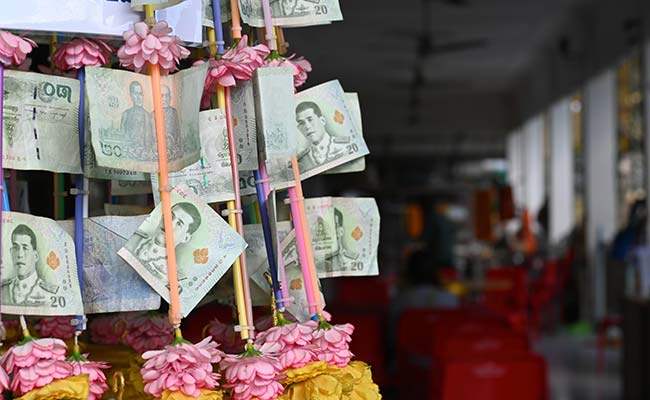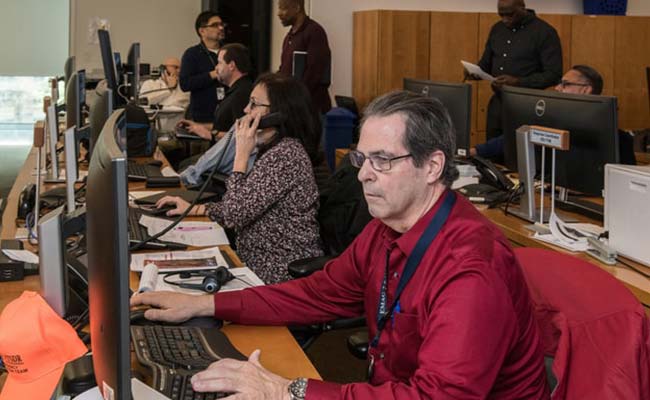Relocating to a different country comes with a multitude of considerations, with the most important one being your finances. So as you plan the next chapter of your life, it is essential to approach financial planning with confidence and foresight.
Whether you're in the early stages of planning your move, about to move, or have already relocated, when it comes to savings, investments, pensions, IHT, and tax affairs, there is a lot to think about.
While this guide does not provide financial advice, it will give you a handy list of financial considerations to make sure you have everything covered.

Contents
Adequate Savings
Prior to your relocation, it is crucial that you have a solid financial foundation. The amount of savings you will need will vary depending on factors such as your age, the size of your family, your living arrangements and whether or not you have employment secured in Thailand.
At the very least, ensure you have enough to cover initial accommodation costs, including a security deposit and the first few month's rent and living expenses.
It is prudent to save more than you initially anticipate. Unexpected expenses can arise, such as extended storage for your belongings, additional travel expenses, furnishings for your property, or legal costs associated with purchasing or renting property.
You will also need savings going forward. You may need to take an emergency flight back home, or require some dental treatment that isn't covered under your health insurance.
Also consider that some visas require a bank deposit. For example, a 1-year retirement visa extension requires proof of a monthly income of 65,000 Baht, or a bank deposit of 800,000 Baht (deposited 60 days prior to the extension/renewal).
By having adequate savings, you can cushion yourself against unforeseen circumstances. Having an emergency nest egg makes the transition far less stressful, as you won't constantly be pre-occupied with the thought of running out of funds.
Of course, if you're a twenty-something with just a couple of grand in the bank and you plan on teaching in Thailand for a couple of years, you don't need to worry so much: You can live life on a shoestring budget and be happy in the moment. But for guys who are 40, 50, 60+, life dictates that you have all your ducks in a row, so to speak.
Budget Planning
While it may be impossible to anticipate every expense, it's important to plan your budget as thoroughly as possible before your move.
Conduct research on the cost of living in Thailand for the lifestyle you want to lead, including rent or property prices, food expenses, transportation costs, utilities and discretionary spending on entertainment.
Keep in mind that living costs will vary depending on the specific location you are moving to. For example, Bangkok has higher living costs compared to rural areas of the north and northeast.
Try to approximate your monthly expenses, and then calculate that against what you can afford, or what you want to spend. It might mean renting a one-bedroom apartment instead of a two-bedroom, or eating out at a nice restaurant two nights per week instead of three. Cut according to your cloth, as they say.
Utilize online resources like this one to gather information on the cost of various items and services in your new home. By carefully calculating your anticipated expenses, you can better manage your finances and ensure a smoother transition to your new life.
Renting Out Your Home
Renting out your home can fund your living expenses in Thailand. However, there are several important decisions you'll need to make.
Firstly, if you have an existing mortgage you will need to inform your mortgage provider of your plans. You will likely need to change your mortgage plan suited to rental properties.
Secondly, you must determine how you want to manage the property, including tenant selection and replacement, rent collection and property maintenance. Many people choose to engage a letting agent who will handle all aspects of property management for a fee ranging from 10% to 15% of the rental income.
Tax considerations are also crucial. Your initial responsibility is to inform the tax authority of your country about your intentions to rent your home and live abroad. As a non-resident, you must assess the potential rental income as it may be subject to income tax in your home country, even if you are a non-resident for tax purposes.
Lastly, don't overlook the importance of obtaining suitable expat landlord insurance to safeguard yourself and your property against various risks, including contents, accidental or deliberate damage and potential legal expenses.
Banking
Before your move, it is advisable to transition your financial dealings to online platforms. You most likely already have this in place, but you may have some old savings accounts that are in-branch access only that you will need to change over.
In addition, you may still be receiving paper statements by post, which you can can choose to receive digitally instead.
You will need to notify your banks and any other financial organizations you have investments with about your relocation and ensure they have your updated contact information.
In some cases, certain banks or financial organizations may require a local address. If this is the case, consider asking a trusted relative if you can use their address as a “care of” address. Additionally, make sure the organization has a direct email address to reach you on.
Tip: Use a VPN like this one (Virtual Private Network) to access your online bank accounts in Thailand. This will secure your connection and protect you from data theft.
Depending on your situation, you will most likely want to keep your home banks accounts active and periodically send money to Thailand to cover your expenses.
The most cost efficient way to do this is to use an international online account like Wise to send money to a local Thai bank account.
Make opening a Thai bank account a priority when you arrive. Bangkok Bank and K-Bank tend to be the most “foreign national friendly”. Thai banks require you to have a permanent local address, and also that you open the account in person, so you will have to wait until have completed your move to open an account.
Once you have a Thai bank set up, you can send money to your Wise account from your home bank account, and then forward it on to your Thai bank account.
Transferring money in this way will save you money on bank transfer and currency conversion fees.
+ More information on Wise here
There may be other international bank account options available from high street banks that offer favorable money transfer options, so do check with your provider.
Pensions
If you are retiring abroad, depending on your country of origin, you may be able to arrange for your state and/or private pension to be deposited into your new overseas bank account. Alternatively, you can transfer it using the method outlined in the previous section.
To optimize your financial situation, you might consider transferring your private pension to an overseas pension plan that offers potential tax benefits. However, it is strongly advised to consult with a financial advisor before making any decisions regarding your pension plans.
If you will continue working after relocating, it is important to explore options for contributing to your pension plan and assess whether it is advantageous to switch to an overseas plan.
If you will be employed by a new employer in Thailand, they may already have a pension plan in place, and it would be prudent to gather information and understand the specifics of their plan and whether it is worth paying into before you get started.
Estate Planning
If you are contemplating retirement abroad, it is crucial to engage in estate planning and determine the position of your assets upon your passing.
The first step is to establish a comprehensive Will. It is advisable to have a Will filed in the UK and in Thailand.
Your Thailand Will should be filed with a local solicitor. It will need updating if you acquire new assets in Thailand.
Additionally, it is advisable to consult with a financial advisor who can assist you in effectively managing your estate, thereby minimizing potential tax obligations in your home country such as Inheritance Tax.
+ More on IHT tax rules in Thailand here
+ Specific IHT info for British nationals here
Life Insurance
Due to varying levels of risk associated with different countries, life insurance policies designed for your home country may not automatically provide coverage for all countries internationally, including Thailand.
It is crucial to inform your insurer well in advance, several months before your move. Obtain written confirmation of their agreement to cover you in the new location.
Extending coverage usually requires providing a firm return date to your insurer. If you plan to assume expat status more permanently, you will likely need to seek out a company specializing in expat coverage or an international insurance company offering worldwide policies.
+ Read my tips on getting life insurance in Thailand
Healthcare
There is no free healthcare for foreign nationals in Thailand. There are government hospitals and private hospitals and clinics.
Private hospital care is very good, whereas government hospitals often have long waiting times and a lower standard of facilities. It is therefore preferable that you have health insurance.
Health insurance coverage is often a mandatory requirement for obtaining certain types of visas or long-term stays in Thailand.
For example, the O-A visa requires you to have health insurance as standard. The Non-Immigrant O Visa (single entry, 90 days), which most retirees use to enter Thailand before doing their 1-year retirement extension, also requires health insurance to cover the initial 90-day period. After you have done your retirement extension, you can let it lapse.
Not having health insurance will mean paying for treatment out of your own pocket, which could be very expensive. Health insurance provides coverage for various medical expenses, including hospitalization, surgeries, doctor visits, medications, emergency treatments, and medical evacuation and repatriation.
Some health insurance plans specifically cater to expats and offer additional services tailored to their needs. These services may include English-speaking doctors, international referrals, 24/7 assistance, and access to specialized treatments or medical facilities.
+ See Cigna for a quote (takes 2 minutes)
Depending on your budget, you can choose from international health insurance or local domestic insurance. The latter is more affordable, but won't cover you when you travel to countries in the surrounding region or back to your home country.
+ See domestic insurance quotes here
Having health insurance as an expat provides peace of mind, knowing that you have financial protection in case of any medical emergencies or unexpected health issues. It allows you to focus on your new life and experiences without the constant worry of potential healthcare costs.
Taxes
Before making your move to Thailand, it is essential to have a clear understanding of your tax obligations in your home country.
You may still need to pay tax on property and investments in your home country regardless of your residency status. You should contact your accountant or local tax authority to get the most up to date information.
The good news is that Thailand has double tax treaties with most countries. The purpose of a double taxation treaty is to prevent double taxation by allocating taxing rights between two countries. These treaties typically cover various types of income, including but not limited to, personal income, corporate profits, dividends, interest, royalties and capital gains.
Thailand's tax system encompasses both residents and non-resident individuals, imposing taxes on Thai-sourced income regardless of whether it is received within or outside the country.
Income originating from the performance of a duty, post, employment, or office within Thailand, as well as income generated from a business conducted in Thailand or from property situated in Thailand, is considered sourced within the country.
Individuals, whether residents or non-residents, who earn taxable income from employment in Thailand are required to pay personal income tax on the entirety of the income associated with their employment within the country.
Additionally, residents are also liable for income tax on foreign-source income that is paid or remitted to Thailand within the same calendar year it is received. The maximum tax rate, which applies to both residents and non-residents, stands at 35 percent.
In short, it is best not to transfer money to Thailand in the same year that it was earned, otherwise it will be subject to taxation in Thailand.
Retirees do not have to pay taxes on any income earned from overseas sources. This includes pensions. Additionally, retirees in Thailand are not required to pay personal income taxes. However, it's important to note that working in Thailand while on a retirement visa is not permitted.
Seeking professional advice from a tax expert or accountant who specializes in international taxation will provide invaluable guidance in navigating the complexities of your tax situation.
Investments Such as ISAs & Roth IRAs
If you currently hold an ISA (Individual Savings Account) and are contemplating a move abroad, you should be aware that maintaining a permanent UK residential address is typically a requirement for tax purposes.
This means that you may not be eligible to make further contributions to your ISA while you are living overseas. However, there are several factors you should take into consideration before making a decision. These include deciding whether you wish to retain your ISA during your time abroad, planning payments before your departure, and evaluating the possibility of returning to the UK in the future.
If you are a U.S. citizen residing abroad, you have the opportunity to maintain both a traditional and/or Roth IRA. The main considerations revolve around making contributions. If you already have an existing IRA prior to moving abroad, there is no requirement to dispose of it or transfer assets. However, you may face limitations on adding to it while living overseas.
To better understand IRAs, it's important to distinguish between the two types:
- Traditional IRA: Contributions to traditional IRAs may be tax-deductible depending on factors such as your income, filing status, and whether you have an employer-sponsored 401k, pension, or receive social security benefits. You can open or contribute to a traditional IRA if you (or your spouse, in the case of a joint return) earned taxable income during the year and are under the age of 70.
- Roth IRA: Contributions to Roth IRAs are not tax-deductible, and certain income requirements must be met to be eligible for contributions. The advantage of Roth IRAs is that qualified distributions are tax-free.
There are, of course, other types of investments such as bonds and stocks and shares. You should consult a financial advisor to get independent advice on whether it is best to keep your investments as they are or reinvest elsewhere.
Consulting a Financial Advisor
When it comes to matters of tax efficiency, investment planning, and life insurance, seeking advice from a fully qualified Independent Financial Advisor (IFA) with extensive experience living in Thailand can be invaluable.
An IFA who has resided in Thailand for many years and has assisted numerous clients brings a deep understanding of the local financial landscape and the unique challenges and opportunities it presents.
Their expertise can help you identify tax-efficient investment strategies, pension planning, and ensure compliance with local laws. Additionally, they can provide guidance on life insurance options tailored to your specific needs, ensuring you and your loved ones are adequately protected.
My IFA has assisted me and my family for a number of years now, in both pension planning and life insurance.
He is fully registered with the Chartered Institute of Insurance UK (CII) & Chartered Institute for Securities and Investment (CISI). He is globally licensed, with offices in the UK, US, Europe, and Asia, enabling him to work with clients from all across the world.
If you'd like a personal referral, I can introduce you.
+ Please fill out your enquiry here.
A Final Note
It's important to note that the information provided in this article is based on my personal opinion and general observations having lived in Thailand for 15 years. It is not intended as financial advice.
Factors such as individual circumstances, goals, and risk tolerance should be taken into consideration when making financial decisions. Therefore, it is recommended to consult with financial professionals or experts who can provide personalized advice tailored to your specific situation.
I hope this article has provided some useful insights, but please remember to conduct your own research and seek professional guidance before making any financial decisions.
If you have any further questions or need additional information, please feel free to ask in the comments section below.
Last Updated on



Michael B. says
Jun 30, 2023 at 11:27 pm
TheThailandLife says
Jul 01, 2023 at 2:10 am